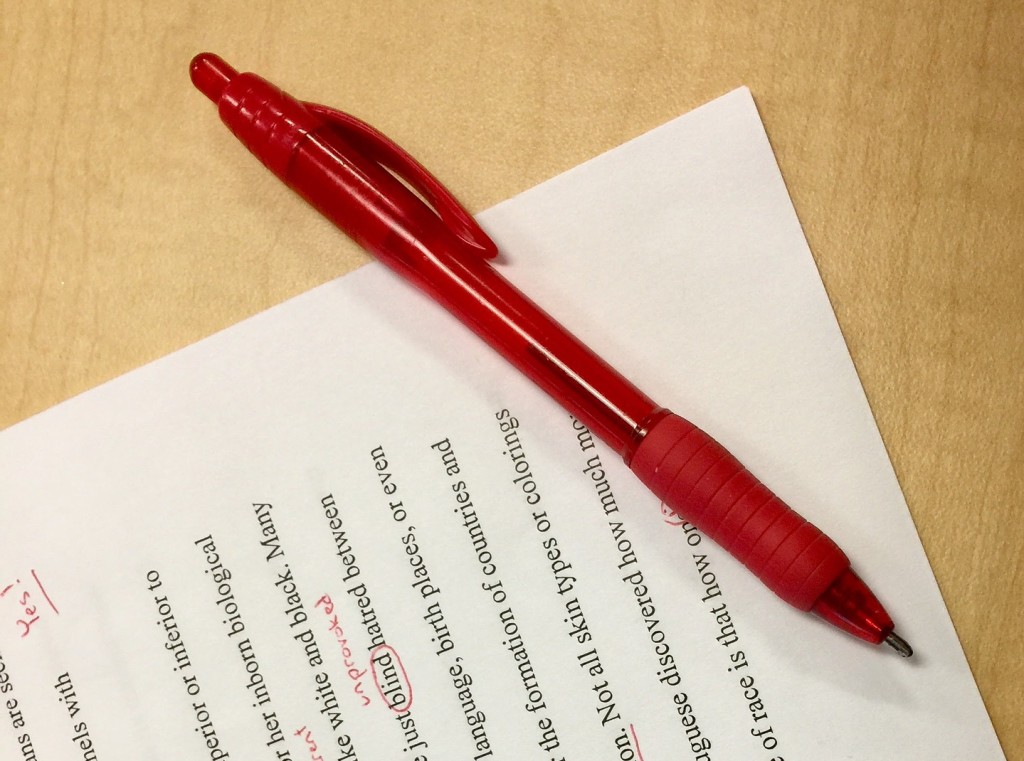Wrestling With Your Writing
Interviewer: How much rewriting do you do?
Hemingway: It depends. I rewrote the ending of Farewell to Arms, the last page of it, 39 times before I was satisfied.
Interviewer: Was there some technical problem there? What was it that had stumped you?
Hemingway: Getting the words right.
– Ernest Hemingway, The Paris Review Interview, 1956
Revising your writing and polishing it are two very different tasks, and though the terms certainly have intersecting qualities, there are distinct differences. Revising is an entire re-vision, a re-looking at the piece and involves heavy re-drafting, often total re-writing. It’s a broad look at things like structure, voice, pacing, sound and a minute and ruthless look at each sentence—is it carrying weight? Is it doing something to further the point? Editing, or polishing, is meant for the final look after the revision has taken place—catching spelling and grammar errors, deleting and adding and moving words. Often a great piece of writing has been revised, or as I like to think of it, re-visioned many, many times. Works of great writing can take years, even decades to complete, and I think it’s important to remember that even the best writers wrestle with their content before it shape shifts into the published version. It’s true that a little bit of wrestling is important when drafting content of any kind, from an epic novel to a company newsletter.
What can be applied to creative writing can be applied to PR. In both senses the writer is creating a world, an experience, a sound and a story. A package that will bring meaning into the reader’s mind. If done well the power of the written word cannot be replaced or compromised. And I think the power of the word rarely happens in a fit of rushed inspiration, but rather in that focused time of revision, when a total re-imagining takes place.
When I grade my writing students, I look at their commitment to revision more than anything else. I do not expect perfection in the first draft—in fact the opposite. I expect it to be messy, full of conflicting ideas, a war-torn land baring the scars of the writer’s process. Their grade is based instead on the journey from draft one, to two, to three, to final. How far did they push the language, what risks did they take? How evident is their total re-imagining? Simply polishing won’t cut it.
So just what does a total revision entail? It would be nice to have infinite time for exhaustive revisions, and of course, in a fast paced professional world, often content has to be completed and sent out within the day, even within the hour. Regardless, take to heart the below revision tips. Even the slightest effort here can make a big difference in writing of all kinds. And by knowing you will be going back and revising your writing, the pressure to produce a perfect first draft melts away.
Strategies for Revising Your Writing, or “Re-Seeing”
Share your work. Have a few trusted readers on hand, and allow them to read your writing. Enter a dialogue about the message you are trying to convey, and access their experience as a reader. Is it consistent with your goal? What might you add? What wasn’t useful? Be sure to communicate what kind of feedback you are looking for. An extra set of eyes is a great way to catch errors and expand and execute complex ideas. What sounds great in your head may not always make sense to someone else.
Read aloud
You may feel silly talking to yourself, but this is one of the simplest ways to detect tone inconsistencies, missing words, and run-on sentences. You will also get a feel for rhythm and sound that doesn’t come through in silent reading. Sometimes hearing yourself transition from idea to idea can provide new insight to structural revision possibilities as well—if there’s something clunking around in there, your ear will hear it.
Don’t be afraid to start over.
We all want to get it right the first time, but sometimes opening up a new blank doc and re-writing the piece is a sure fire way to strip away the sentences that didn’t work the first time, and bring important ideas to the surface.
Read a hard copy.
In my experience, whenever I print something out and read it, I see things I didn’t notice on the computer screen. It pays to take a pen and mark up your sheet.
Reverse order.
Try reading your work from the last sentence forward. By isolating each sentence, your brain cannot skip ahead. You may just find errors you would have missed.
Take a break and read something else.
It always pays to pause when revising your writing. Even if you only have a few minutes, it’s helpful to put your writing away and read another piece of work. Then go back to it with fresh eyes. The small break can also spur new thoughts and ideas for your revision.
Featured image by Nic McPhee. https://www.flickr.com/photos/nics_events/2349630643

